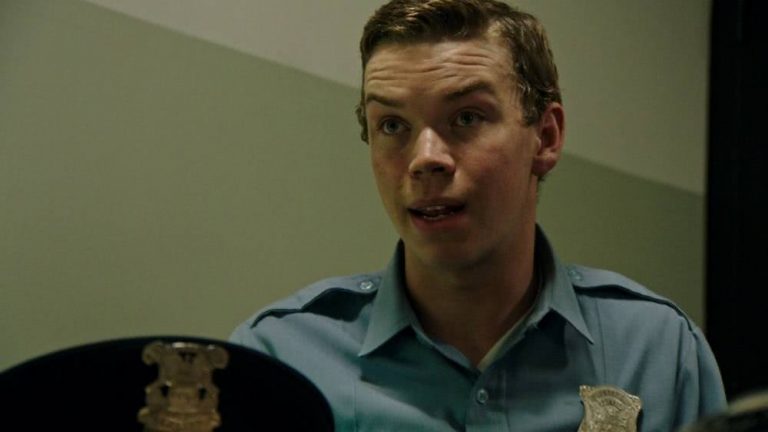When Will Poulter first laid his hands on a script marked Untitled Kathryn Bigelow Project he knew he was on to something significant. The film, subsequently titled Detroit, tells the story of the Detroit race riots of 1967, and in particular a violent altercation at an inner-city motel in which police shot and killed three young black men and brutalised many others.
Poulter plays the role of Krauss, an unrelentingly brutal policeman whose racial prejudices and vitriol spurs much of the film’s central conflict. His was an immensely challenging role to play, and one that he describes as being perhaps the most important of his career to date. Fittingly then, preparing for the part proved difficult.
“The worst preparation I could possibly have done to play a racist is to educate myself, because racist people are undereducated, or they’ve been educated about the wrong things; they are innately misinformed,” he explains. “It was quite tricky; I had to believe in a bunch of propaganda. I had to believe in a bunch of bullshit in order to properly play my character.”
And yet however daunting the prospect may have been, Poulter has never been one to shy away from a difficult character. “I like the challenge that lies in encouraging people to see from the perspective of someone who is not necessarily obviously likeable; someone who isn’t innately empathetic.” Fittingly then, for years now, Poulter’s only preference has been “to play characters with integrity – even if that is an ugly form of integrity; people who are believable and real.”
And believable he is. The combination of Bigelow’s trademark cinéma vérité style and Poulter’s explosive and terrifying performance results in a film that is almost stiflingly intense. As Krauss beats and threatens the young men and women in the motel we, the audience, are made to feel as though we are in there with them; as though we are just as trapped, and just as cornered.
This effect was in part achieved thanks to Bigelow’s unconventional shooting schedule. Many of the young actors – breakout stars like Algee Smith, Anthony Mackie and Jacob Latimore – were deliberately left in the dark as to which scenes would be shot on which day, meaning the fear and anguish on their faces was mostly authentic. Poulter however, as the architect of much of the chaos, was one of the few given the schedule in advance, and the emotional intensity he had to draw from the other actors did eventually take its toll.
“Most days I really just wanted to go home, try and get the best night sleep possible and just take on the next day. I think too much time conscious, awake and on my own in the process of shooting this film meant that I would sort of eat away at myself and guilt would kind of rack up and take over; I needed to just be a bit robotic.”
Most days I really just wanted to go home, try and get the best night sleep possible and just take on the next day.
The filming process was also uniquely surreal, in that three of the people present for the actual Algiers Motel Incident were on site as consultants: Cleveland Larry Reed, Melvin Dismukes, and Julie Hysell. Ms Hysell, played by Hannah Murray, is a white woman from Ohio who had been staying at the motel with a friend on the evening of the incident, finding herself brutalised and harassed by the police alongside the African-American men.
Her experiences and testimony proved vital for Poulter in developing his performance. “Julie’s strength and composure on set while we recreated what I can only imagine to be the most harrowing moments of her life was astonishing,” says Poulter. “It was so inspiring and invaluable to us in terms of doing things accurately.
Indeed, the young actor considers the whole experience deeply transformative. It not only opened his eyes to the structural nature of racism – to the brutalities enacted upon minorities everyday – but, perhaps most importantly of all, it taught him about the extraordinary power of empathy. “I received an education, and I hope that everyone gets to have the experience that I’ve had, in a way. I know not everyone gets to be part of a film like Detroit, but hopefully everyone receives that sort of education one way or another.”
After all, even if the audience may not ever get the experience of creating a film with the raw political power of Detroit, there is still much to be gained from taking the time to see it. It is an unflinching, unrelenting indictment on racial violence that speaks volumes to the experiences of people of colour in the present day.
“And that’s the thing about watching this film,” suggests Poulter. “You’re not just receiving a piece of entertainment, or something that really emotionally affects you and then leaves you a few days later. I think the full potential of this film is characterised by people who gain a life-changing vantage point on how the world works: how it has worked, and how it can work, looking forward.”
When asked about his own future, Poulter is quick to return to the power of Detroit, and the revolutionary value of cinema. “I think being a part of a film like this has increased my appetite to be in films that are responsible from a socio-political standpoint; films that seek to do more than just entertain. And while there’s room for everything, and I may well be part of films in future that aren’t as political as this one, I hope I can be in more of them.”
Detroit is in Australian cinemas on Thursday November 9.
For more Brag film content, read our review of the new Saw film, Jigsaw, here.

































